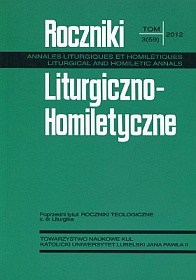Misuses of the Eucharist in the Light of Medieval Penitential Books (“Libri Poenitentiales”)
Abstract
The Church’s penitential practice has been changing over the centuries and it assumed various forms. One of the interesting issues in this field is showing the attitudes assumed by the clergy and the faithful towards the Eucharist, and presenting the misuses that they could commit. The misuses concerned both the conditions one had to meet in order to properly celebrate the Holy Mass, the very celebration, and storing the Eucharist. In most penitentials it was stressed that the Holy Mass should be celebrated in one’s own community, and outside it – only with the bishop’s permission. It was also emphasized that a priest was allowed to celebrate a definite number of masses on a given day and on one altar (about five). It was impermissible for a priest to offer a Holy Mass for suicides or for persons who were sentenced to death. Priests had to take care of the proper form of celebration. According to penitential books it was a sin if a priest lost the corporal, if he celebrated the Mass while being intoxicated, or if he said the texts of the Mass —especially the Mass canon—carelessly. Medieval penitential books allow learning about the care with which the Eucharist was treated, and what misuses could be committed by the Christians of those times. Numerous canons presenting irregularities and the penances corresponding to them allow showing the timeless value and beauty of the Eucharist as the source and the peak in the life of the Church.
References
Gaastra A. H.: Between Liturgy and Canon Law: A Study of Books of Confession and Penance in Eleventh- and Twelfth-Century Italy. Utrecht 2007.
Hough C.: Penitential Literature and Secular Law in Anglo-Saxon England. „Anglo-Saxon Studies in Archaeology & History” 11:2000 s. 133-142.
Körntgen L.: Studien zu den Quellen der frühmittelalterlichen Bußbücher. (Quellen und Forschungen zum Recht im Mittelalter 7). Sigmaringen 1992.
Kunzler M.: Liturgia Kościoła. Poznań 1999.
Lutterbach H.: Sexualität im Mittelalter. Eine Kulturstudie anhand von Bussbüchern des 6. bis 12. Jahrhunderts. (Beihefte zum Archiv für Kulturgeschichte 43). Cologne 1999.
Martimort A.G.: Handbuch der Liturgiewissenschaft. T. II. Freiburg–Basel–Wien 1965.
Muzzarelli M.G., Giuseppina M.: Una componente della mentalità occidentale: i penitenziali nell’alto Medio Evo. Bologna 1980.
Muzzarelli M.G.: Penitenze nel Medioevo. Uomini e modelli a confronto. (Il mondo medievale. Sezione di storia delle istituzioni della spiritualità e delle idee 22). Bologna 1994.
Schmitz H.J.: Die Bussbücher und die Bussdisciplin der Kirche. Mainz 1883.
Vogel A.C.: Il peccatore e la penitenza nel medioevo. Il Edizione italiana riveduta e ampliata a cura di Clara Achille Cesarini. Torino 1988.

